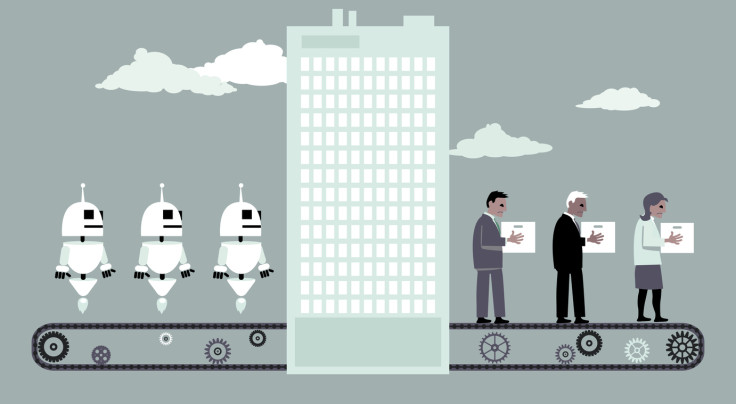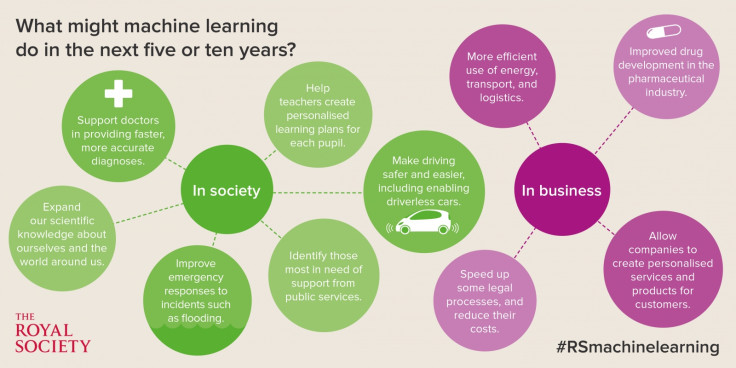Royal Society: We must take action on AI machine learning to safeguard our futures

KEY POINTS
- RS calls for urgent action to develop machine learning so it benefits everyone.
- Students in professions with a duty of care such as healthcare and law must be trained to deal with machine learning.
- Humans will always be in control – artificial intelligence is meant to aid us, not replace us.
The Royal Society is calling for governments, academia and industry to work together urgently to ensure that machine learning develops into a technology able to benefit the UK as a whole, as an antidote to fear mongering about the future dangers of artificial intelligence.
The UK's science academy has spent a year and a half working on the report, entitled "Machine Learning: the power and promise of computers that learn by example", in order to find out how the UK general public views machine learning.
The report also outlines suggestions for how government regulation and education can be best put in place to accelerate growth of this industry in the UK to ensure that humans stay in control of machines.
To write their report, the Royal Society interviewed 200 experts from across a wide range of fields to find out whether machine learning is already being used in different industries, as well as interviewing people to find out what they think about its effects.
What is machine learning?
Machine learning is a type of computer science that governs how machines are able to process data and gain insights from it that might be useful to humans. This is a type of artificial intelligence, and it is used by everyone from Google and Facebook to even your supermarket to look at what you buy and how frequently.
Due to the huge amount of data involved, there are concerns about how the data will be used and stored in order to ensure our privacy.
One example is the controversy over Google DeepMind's partnership with the NHS. The NHS gave DeepMind access to 1.6m patients' records from three London hospitals so that the computers could understand how to improve healthcare practices.
Since the data contains sensitive information, such as the identities of patients who are HIV-positive, critics have asked why Google needs all this data and whether it will really be kept secure.
There has also been an increase in scare mongering over the last two years about the concept that "robots will take over our jobs" by increased automation of processes in the workplace.
What does the general public think about artificial intelligence?
The science academy found that although most of the UK general public does not know what the term "machine learning" means, they have all interacted with the technology simply by using apps and online services.
Concerns about the use of machine learning vary depending on the industry – on the whole, most people were positive about the technology being used to improve healthcare and develop medicines that would improve lifespan and quality of life, or about the technology being used to tackle global problems like food shortages.
However, people were concerned about the potential for machines to replace them in the workplace and whether autonomous machines, like self-driving cars, would be safe.
There were also societal concerns that machine learning would make human existence less personal, so where once driving could have been considered as a hobby to de-stress, it would be eradicated by self-driving cars.
And while social networks tailoring user experience would ensure that users see content that they would like, it might also cause them to live in a "bubble" and miss out on other things going on in the world.
Decisions about machine learning need to be made now

The Royal Society says that there are clearly a great many benefits to machine learning, from improving medical diagnoses, drug development and speeding up scientific discoveries to tailoring education to meet students' individual strengths, identifying people who would most benefit from public services, speeding up legal processes and even enabling self-driving cars to stay safe on the roads.
However, rather than allow the technology to organically develop, careful guidance and stewardship is required by policymakers, academia and industry over the next decade.
Since machine learning can be used in many industries, students in schools and universities must be made aware of how the technology works and the importance of ensuring they make the right decisions with the data available, keeping it secure. This is especially a concern in fields where the profession has a duty of care to people, such as in healthcare or law.
Dealing with bias and a skills shortage
The science academy also recommends that courses on data science include modules on ethics to help train people to avoid bias when designing computer algorithms, and increased allocation of PhD places for machine learning to meet the severe shortage of people trained in the field. Research is also needed to define and investigate potential issues with machine learning so that the technology continues to benefit the country as a whole, rather than a few select companies.
"There's an acute shortage of people trained in this field, some tech companies can offer much better salaries and resources. We want to do everything to make the academic world more attractive, or to have a world where there is one foot in academia and one in industry," Professor Peter Donnelly FRS, chair of the report's working group, Director of the Wellcome Trust Centre for Human Genetics and Professor of Statistical Science at the University of Oxford, said at the press conference.
"It is clear to us that the world we're in at the moment, with the data being collected about us from our phones and other devices – this world has outgrown the existing framework. There needs to be a new framework for governance of data. Some sectors will require more regulation, like healthcare, but others, like a company reorganising its warehouse, will need less. We as a society need to decide how algorithms work, should they be fair and unbiased, should they be transparent?"
© Copyright IBTimes 2025. All rights reserved.






















